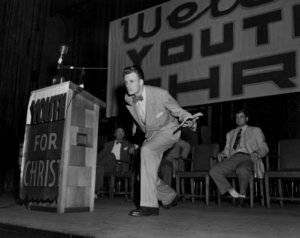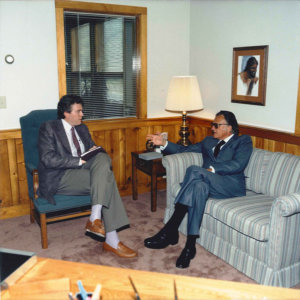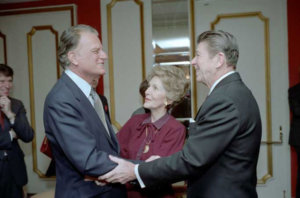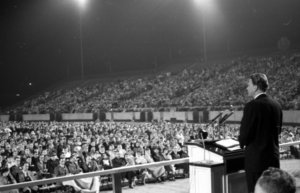The Principles of a Master Communicator: Billy Graham Turns 99
Published on November 19, 2017, at 1:30 p.m.
by Maggie Schneider.
An early adopter of new media filling stadiums around the world, the face of a global organization sparking reform in oppressed nations, a best-selling author with a unique life story — does all this refer to a rockstar, an industry tycoon, a reality star or maybe all three? No one would have guessed that it would be the description of a humble preacher from the hills of North Carolina, William F. Graham Jr. — better known as Billy Graham.
In November of 2017, Graham celebrates his 99th birthday. As individuals all over the world remember the life of the man who took the Gospel to the corners of the globe, they can learn how one of the greatest communicators of all time touched the hearts of all nations.

New media
Billy Graham began his vocational missions work with Youth for Christ a few years after World War II. He led tent revivals, known as crusades, across the U.S. and in Europe. These crusades quickly packed out the tents they were held in and were often extended for weeks at a time as crowds continued to overflow the seats. Graham was not satisfied. He wanted — he needed — to reach more people.
Graham’s sermons from the crusades had been broadcast over radio several times, as had certain sermons from other preachers. However, in 1950, Graham and his music and program director, Cliff Barrows, started “The Hour of Decision,” a weekly show recorded specifically for radio to be broadcast across the U.S. This new avenue of ministry meant that Billy Graham was able to speak directly to people in their homes, spreading his message further than any of his crusades ever could.
Around the same time he started “The Hour of Decision,” Graham founded the Billy Graham Evangelistic Association (BGEA), which to this day conducts crusades and festivals while equipping missionaries and aid workers across the globe. It also continues Graham’s work not only in radio but also in television.
While TV was still in its infancy, Graham was determined to take advantage of the new media. Soon, “The Hour of Decision” became a TV program, and the Billy Graham Crusades were being broadcast in the U.S. and around the world.
The crusades continued to be Graham’s passion, and he set record attendances in cities like New York and London. In 1989, the crusades used new satellite technology to broadcast the messages live anywhere in the world. Graham continued speaking at crusades well into his 80s before failing health forced him to retire to his home in Montreat, North Carolina. By the end of his career, Graham had spoken to almost 215 million people in live audiences in 185 countries — more than any other person in history.

Relationships
According to Kerri Ridenour, vice president of operations at A. Larry Ross Communications (ALRC), a PR firm founded by Billy Graham’s principal spokesperson for 30 years, one of the keys to Billy Graham’s success was his skills with relationships, especially with the media.
“He really treated all media the same,” said Ridenour. “It didn’t matter if it was Ted Koppel or Diane Sawyer, or it was a radio host or a newspaper article — he had no favorites. He was pursuing value and using their vehicles. He would be what we call an early adapter. He did really forge the path for others to use every vehicle. He was cutting-edge. He was using radio way before anybody else, and he created faith-based movies. But he didn’t just do it for promotions; he did it for relationships.”
Billy Graham became a household name through his relationships with the media. At first, the 1949 Los Angeles Crusade had a lukewarm reception from the press. Instead of firing back at snarky editors, Graham invited them to come to the crusade and see it for themselves. One prominent editor did just that and the very next day the newspaper writers were told to “puff Graham.”Papers across the nation began to notice the young firebrand preacher from North Carolina.

Integrity
Billy Graham’s focus on relationships did not end with the media, however, as Kristin Cole, vice president of account services with ALRC, points out.
“He kept not just authenticity but respect for what needed to stay private versus what needed to stay public when it came to meeting world leaders and what to share with the media versus what really doesn’t need to be shared with the media. Some people don’t have that internal filter, and he always did.”
Because of Graham’s integrity, heads of state felt safe trusting him with their personal feelings and faith. Billy Graham became known as “Pastor to Presidents” as he was able to keep close ties to the U.S. president, counseling them whenever he could. The leaders of foreign nations trusted Billy Graham to keep his word so much that they allowed him to visit the Soviet Union in the early 1980s on the condition that he would not speak out publicly against the Communist administration. Graham complied with their wishes. A few years later, he was invited to hold his crusades in the Soviet Union, becoming the first person to preach publicly behind the Iron Curtain.
Honesty
Billy Graham was often called upon to comment on issues the U.S. faced.
As Melany Ethridge, senior account executive at ALRC, put it, “When they say he preached with a Bible in one hand and a newspaper in the other, he would still drive it back to the Cross. He could look at the societal ills, whatever was going on — for example, racism — and he knew that a private relationship with Christ was the solution to that problem. We want to use politics and establish programs, but if we get our hearts right, we recognize the value of every human. So if a community struggled with racism, he would preach that message that we are all the same and all need to get our hearts right with God.”
But even when he was pressured to comment in times of crisis, there were times that he just did not have an answer. Instead of declining to comment, he always went back to his key message that all people need the salvation of the Cross.
Just after Sept. 11, 2001, Graham was asked to speak at the Washington National Cathedral. To those gathered and to a grieving nation, Graham said, “I’ve been asked hundreds of times in my life why God allows tragedy and suffering. I have to confess that I really do not know the answer totally, even to my own satisfaction. I have to accept by faith that God is sovereign, and he’s the God of mercy and compassion in the midst of suffering.”

His legacy
Whether live in a stadium, in a radio recording booth, on a television stage or seated across from a reporter, Billy Graham was a master communicator. With his life built on the foundations of putting relationships first, always acting with integrity and maintaining honesty even in a crisis, Graham was able to reach the hearts of people across the world with his message. And the ideas still apply today.
“What we have to do today as PR people is use every vehicle to tell our story,” said Ridenour, “but the confusion becomes from the fact that we live in a society that is so promotional. We use everything we can to market ourselves and to promote ourselves, but Billy Graham was never marketing himself or promoting himself. He was really just using the power of story to compel relationships. Those are transferable principles to right now. You’re going down the wrong path if you’re using PR to promote because PR is about transforming life through the power of story. That’s what he did.”
From his birthplace of Charlotte, North Carolina, to the heart of the Soviet Union, whenever he was about to be interviewed and had to give a mic check, Billy Graham would always make sure at least one person had heard his message — even if it was only the sound operator — by reciting the Bible verse he desperately wanted everyone to hear, “For God so loved the world that He gave His only begotten Son, that whoever believes in Him should not perish but have everlasting life.”




